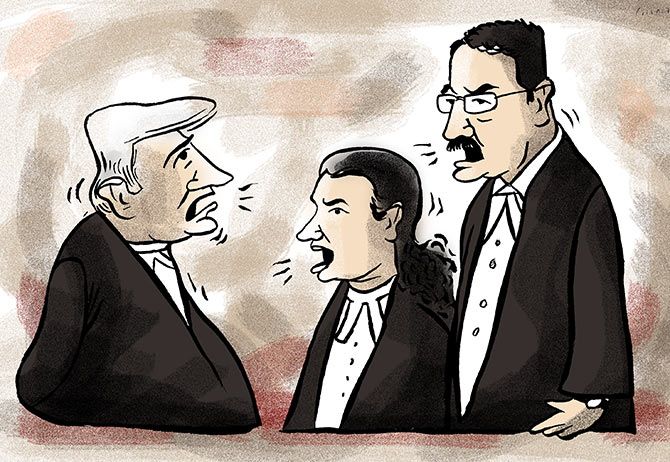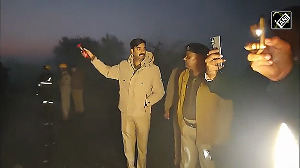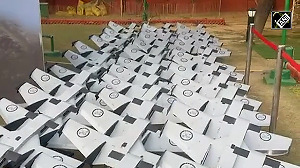Noise levels began to climb and everyone else in the room stared agape as the fracas escalated, including the trio of accused at the back.
Peter, Sanjeev and Indrani stood at the edge of their enclosure craning to see the spectacle.
Vaihayasi Pande Daniel reports from the Sheena Bora murder trial.
Illustrations: Uttam Ghosh/Rediff.com

If you climb up to the third floor of the five-storey annexe of the Mumbai city civil and sessions court in south Mumbai, where the Sheena Bora murder trial is being held, for say the first time, you should be forgiven for wondering where you have come.
You will feel nothing short of bewilderment as you ascend this building, staircase by staircase.
At each floor dirty dustbins, soiled dishes, masses of trash, empty soft drink and mineral bottles, rusted grilling, dust and cement greet you.
Throngs of people crowd the area near the landings -- many of them sitting on the steps for lack of seating.
When you reach Courtroom 51 on the third floor, and your destination, an enormous pile of rubble welcomes you.
It consists of discarded paper, dusty piles of cement bags, large plastic jerry cans, cement trays and empty sacks.
A giant drum, partially filled with water, sits squat in the middle of this tiny space where the accused and their relatives gather.
True, the building has -- for far too many months -- been under renovation.
But any newcomer will only react with shock when he contemplates this important court of India's most advanced city.
If the court looks like this, you ponder at what the city's jails could be like. Or Mumbai's police station lock-ups.
The April 6 hearing in the Sheena Bora murder trial saw senior advocate Shrikant Shivade, who represents Peter Mukerjea, finish cross-examining the prosecution's first witness (PW1).
Since this complicated case began in February 2017, just two witnesses have been processed, before two successive judges, in the intervening 14 months.
Two witnesses in 400 days.
Shivade, 60, looking fresh and energetic -- even after an exhausting few days spent representing Bollywood stars Saif Ali Khan, Tabu, Sonali Bendre and Neelam (he was Salman Khan's lawyer in the arms case there in which he was acquitted) in Jodhpur -- briskly got down to questioning Mumbai police Sub-Inspector Ganesh Dalvi before CBI Special Judge Jayendra Chandrasen Jagdale.
He spent just 30 minutes or less peppering the policeman, who had once been attached to the Khar police station, north west Mumbai, with a systematic set of questions and concluded his examination.
Shivade, a stylish lawyer, is all about economy of time.
When you glance into his bespectacled, calm, face, you feel he already has a strategy locked in place and wonder if all his questions are neatly lined up in his brain, on an assembly line, ready to roll off, when he switches on the power button.
Any appearance by this tall, quiet-spoken, but accessible advocate in court attracts attention.
By the time Shivade got up to begin, pulling the little lawyer's writing desk in front of him, the room was packed with way more than its usual representation from the legal fraternity.
Young, budding lawyers always come along to Courtroom 51 to have a peek at the lawyer's courtroom method.
Usually by the end of a hearing in which Shivade has participated, the room no longer has enough chairs -- there are anyway way more locked steel trunks holding legal papers than seating -- for the lawyers. They then gather at the back or in the doorway watching keenly.
The advocate spent the first 15 minutes on Friday discovering Dalvi's familiarity with the Lonavla and Pen localities.
He wanted to know if the sub-inspector, who was part of the group of cops who arrested Shyamvar Pinturam Rai on August 21, 2015, for possession of an illegal weapon, had been to Pen, in Raigad district, or its police station before.
Pen was where Sheena Bora's remains were found.
Dalvi had not.
Shivade then checked the witness's knowledge of the roads to Lonavla (the hill station in the Western ghats) and Pune.
This is an important question for Shivade.
Allegations have been floating around that Peter had also conducted a recce of the Pen area some months before the alleged murder when he had visited Lavasa, near Lonvala.
Shivade: "Have you visited Lonavla before?"
Dalvi: "I have visited Lonavla before on the (Mumbai-Pune) expressway prior to this investigation."
Shivade: "Do you know how to get to Lonavla on the old Mumbai-Pune highway?"
Dalvi: "I have no idea."
Shivade -- in a bid to either methodically record the distances involved in this case or, more likely -- test Dalvi's knowledge of travelling to Pen, asked him a selection of questions about the are around Pen.
He wanted to know the distance between the Khalapur toll naka (on the Mumbai-Pune expressway), and Gagode-Khurd, the village near where Indrani Mukerjea, her former husband Sanjeev Khanna and Rai allegedly dumped Sheena's body and burnt it.
One way of reaching Pen is to take the Mumbai-Pune expressway and then turn off right for Pen at this toll booth.
Dalvi, cool and unflustered on Friday, rattled off durations and distances pit-pat, like a student acing his exam.
He heard each question carefully and then answered with confidence.
Exam Q 1: Time taken to travel from the start of the Mumbai-Pune expressway to the Khalapur toll naka?
Dalvi: "It takes half an hour."
Exam Q 2: Time taken to travel from the Khalapur toll naka to Gagode-Khurd village?
Dalvi: "Half an hour."
Exam Q 3: Distance from the Khalapur toll nakab to Gagode-Khurd village?
Dalvi: "8 to 10 km."
Exam Q 4: Time taken to travel from Gagode-Khurd village to Pen town?
Dalvi: "I cannot say."
Exam Q 5: Distance between Gagode-Khurd village and the Pen police station
Dalvi: "Six to 7 km."
Exam results: 4/5
'Professor' Shivade then asked that the geography books be put away and had the ethics books pulled out for a moral science class.
Shivade, sternly, perhaps with the aim of stirring the policeman's conscience, enquired: "Dalvi Sahib, do you operate on the basis of the rules or do things as per your marzi (wish)?"
Dalvi said he went by the rules.
Shivade: "Do you follow the rules prescribed in the police manual?"
Dalvi, quietly: "Yes."
Shivade: "And the standing orders for the Mumbai police?"
Dalvi: "I cannot recollect."
Shivade -- perhaps because, as he has often told journalists outside Courtroom 51, is the son of an honest Mumbai police officer who died early and somewhat impoverished -- often focuses on police procedure.
In this murder case he has often drawn attention to the importance of the station diaries in documenting evidence.
He tried to have the Khar police station diary brought to court, but his request was denied.
His next 10 questions to Dalvi were about these diaries.
He asked if the sub-inspector either maintained a personal diary or a weekly diary as prescribed by the rules.
Dalvi said he maintained neither, but agreed that every police officer is required to maintain such diaries.
Shivade chewed away at this point, rephrasing the question in many ways.
"Doesn't a police officer have to make entries through the whole week in the weekly diary?"
"Did you not keep a copy of such a diary?"
"Did you not maintain a personal and a weekly diary?"
"Did you obtain permission from a senior officer to not maintain a personal diary or weekly diary?"
"Weren't diaries instituted as a means for seniors to supervise day to day work?"
Dalvi responded to each question in the negative, except the last.
As Shivade persisted, Judge Jagdale began to laugh.
He said, beaming at Shivade, that it was quite apparent that Dalvi had not maintained either types of diaries, so what was the point of still putting more questions to him on the same subject.
Courtroom 51 seems a much sunnier court, compared to the more stiff courtrooms adjacent, downstairs or upstairs because of Judge Jagdale's sense of humour.
On any day, the jovial judge, who can be uncompromisingly firm when he sees the need, breaks the monotony of proceedings with a grin, a joke or a quip of some sort.
Instead of ordering something more harshly of a lawyer, a witness or an accused, Judge Jagdale prefers to soften what he is asking or requesting with a smile.
In response to the judge's intervention, Shivade, who looks to be a fan of order and tidy procedure, requested that he be allowed to wind up this line of questioning with some logical last few questions.
The judge assented.
Shivade in the same Police Diaries vein asked:
"Have any of your seniors asked you if you have maintained a diary?"
"Is there any reason why you have not maintained these diaries?"
"Were you not aware that such a diary had to be maintained?"
Dalvi accordingly offered in return either "Aathvath nahins (I cannot remember)" or agreed.
While delving into current Mumbai police diary procedure, or, at least, Khar police station diary procedure, Shivade asked for more details about how station diaries worked.
He wanted to know that when the police went patrolling to different areas, as per their duty, didn't they sign or make a notation in the station diary for each beat/area covered daily.
He also wanted to know if diaries were maintained at certain fixed posts in a police station jurisdiction.
Dalvi said he could not reccall if he or anyone from his police patrol parties made entries in the station diary or put down their signatures or dates on their routes while patrolling.
Shivade: "Why not?"
Dalvi said he didn't have a reason.
Shivade remarked wryly: "All these witnesses have some selective loss of memory!"
In closing, Shivade rolled out his series of accusations against Dalvi:
"You were in touch with Shyamvar Rai (once the Mukerjeas's trusted driver, but now a sarkari approver in the case) prior to his arrest. You have specially prepared this 'story' with Shyamvar Rai."
"You and (Dinesh) Kadam (the police officer at the Khar police station in charge of the Sheena Bora murder investigation) were both in touch with Rai before his arrest..."
"You have checked (and tampered with) Rai's mobile phone to verify his previous callers (before his arrest)..."
"Did you not feel the necessity to know whom Rai was in touch with (earlier)?"
Dalvi, a tad lamely: "Kadam Sahib was handling that."
With that the lawyer's querying finished and Shivade was done.
So was Dalvi.
Cross-examination of PW1 had finally come to an end.
Likely relieved and anxious to be out the court, where he had spent altogether too many days, the sub-inspector swiftly retrieved his hat, parked it on his head, smartly saluted Judge Jagdale and departed from Courtroom 51 before the judge probably had even completed his dictation of Dalvi's last answer.

Momentarily there was an almost celebratory sense of relief in the room that two witnesses had finished their stints in the witness box.
Then began a noisy quarrel, refereed by an unruffled Judge Jagdale, between the defence and prosecution lawyers.
Noise levels began to climb and everyone else in the room stared agape as the fracas escalated, including the trio of accused at the back.
Peter (in white and khakis), Sanjeev, wearing a yellow shirt and khakis, and Indrani, who looked very business-like Friday in a crisp white shirt, beige trousers and black shoes, stood at the edge of their enclosure craning to see the spectacle.
A few additional bystanders arrived to see the skirmish too.
The reason for the quarrel?
The identity of the next witness.
More crucially, when would the defence get to know who Witness No 3 was and be given time to prepare?
Special Public Prosecutor Bharat Badami began to trade charges with Indrani's lawyer Gunjan Mangla and Shivade.
The discussion began amicably enough with jokes on whether it would be a big fish or a small one.
Judge Jagdale piped in with a grin: "Will it be a mota witness or a chota witness? Or maybe it will be a small man but a big witness!"
Badami, scratching his head, looked troubled. He said he needed time to figure out who it should be.
The judge was troubled with Badami's statement.
Judge Jagdale, seriously: "You should have been aware of whom your witness was going to be."
Badami assured him: "I am very alert."
Judge Jagdale, vigilant of unnecessary delays, ordered: "On April 11 you should bring your next witness."
He announced that the next hearing would be on April 11 at 12.30 pm.
Shivade muttered mysteriously: "Many witnesses have been manufactured.
That remark inflamed Badami: "Manufactured means what?! That remark should not come from a responsible person like you."
Judge Jagdale, ignoring the Shivade-Badami exchange, said: "There must be some basis (on which the next witness is called)."
Gunjan: "At least let us know who the next witness is beforehand."
Badami took off. He said the names would reach the media, suggesting the defence might leak it: "There will be media analysis. Everyone will give XYZ opinion!"
Niranjan Mundargi, Sanjeev's trial lawyer: "Inform only the lawyers."
Gunjan: "The higher court has said that the media is the watchdog of society."
Shivade: "Have an in-camera hearing if you fear the media."
That did not suit Badami who was still not giving any indication when he would disclose the name of the next witness.
Shivade got angry and raised his voice: "Let him cite any trial in history where the identity of the witness has not been disclosed to the defence in advance."
Badami then accused the defence of influencing the witness.
Judge Jagdale interjected, both amused and bemused: "But there have been only two witnesses? One of them is in jail."
The tension slowly climbed down.
Badami assured the defence that he would not disclose the witness on the same day: "Let me think. Let me give my mind to it. I will give the name. I will give in advance. You are not the only ones seeking justice. We are also seeking justice on behalf of Sheena."
Badami added: "We want a smooth trial."
Gunjan: "We also want a smooth trial."
Shivade said with ire that it was impossible to be prepared for 200 witnesses.
Judge Jagdale quipped: "198."
Shivade: "How much in advance?!"
Badami: "A trial is going on. We are accommodating. They are also accommodating."
It was decided that the defence would get at least a day's notice if not more.
Peace then returned to Courtroom 51.
Postscript: Indrani was looking quite well and fit when she departed from the court at about 4 pm on Friday, with Sanjeev and Peter, after spending 20 minutes consulting Gunjan.
A few hours later she was rushed from Byculla jail to the ICU at the Sir J J Hospital in delirious condition, according to the ANI news agency.
Dr Sanjay Surase, the hospital's medical superintendent. told The Times of India that Indrani was now stable, was being evaluated and had been moved to the Critical Care Unit.
- MUST READ: The Sheena Bora Murder Trial










